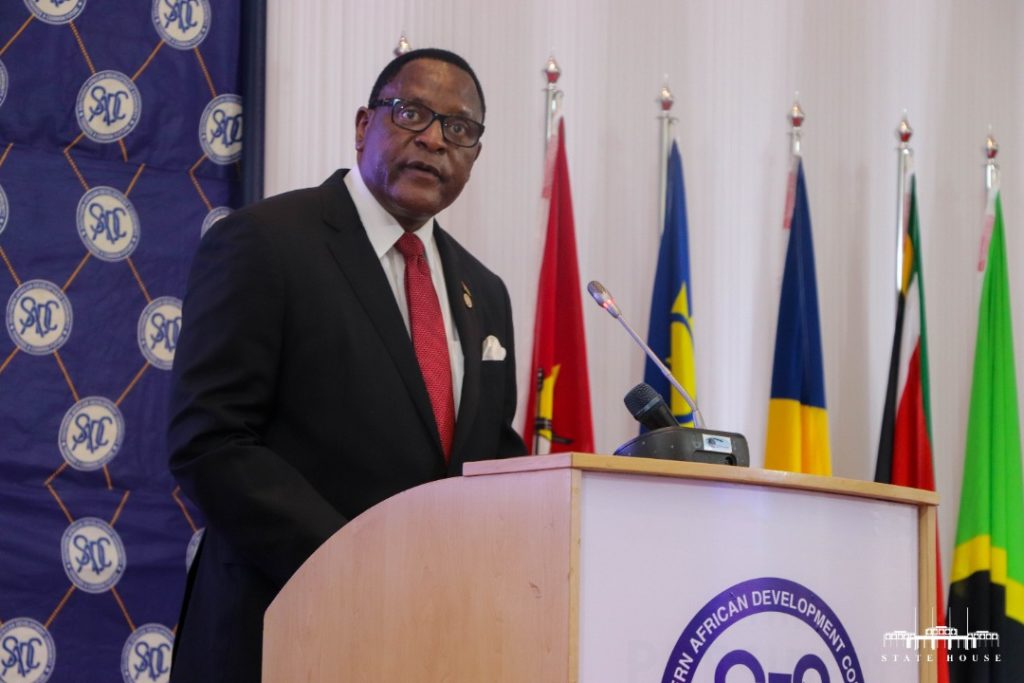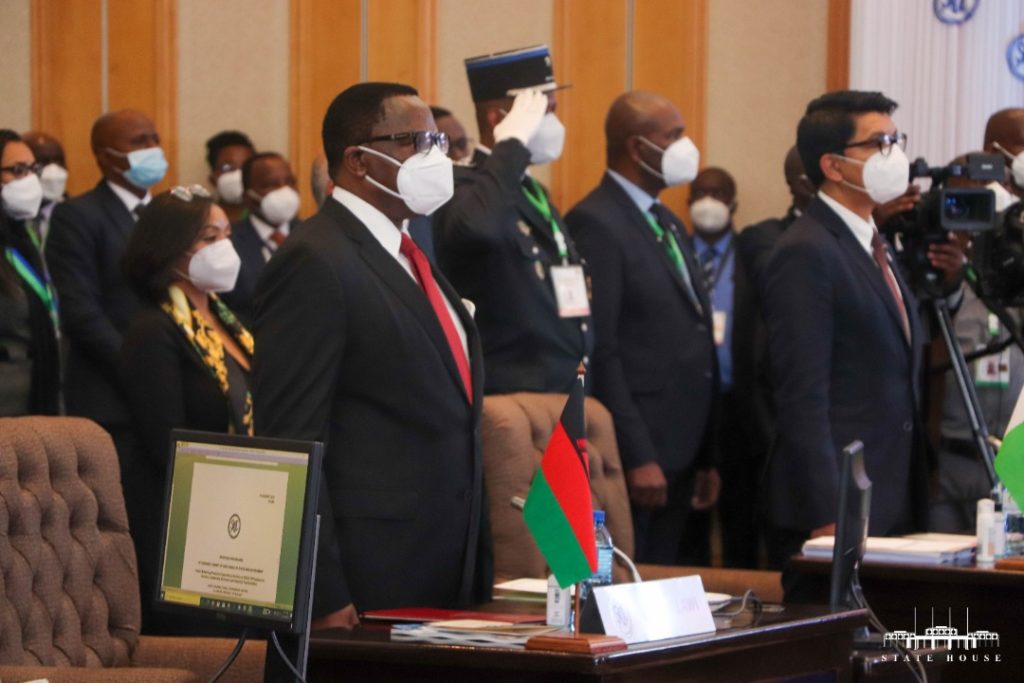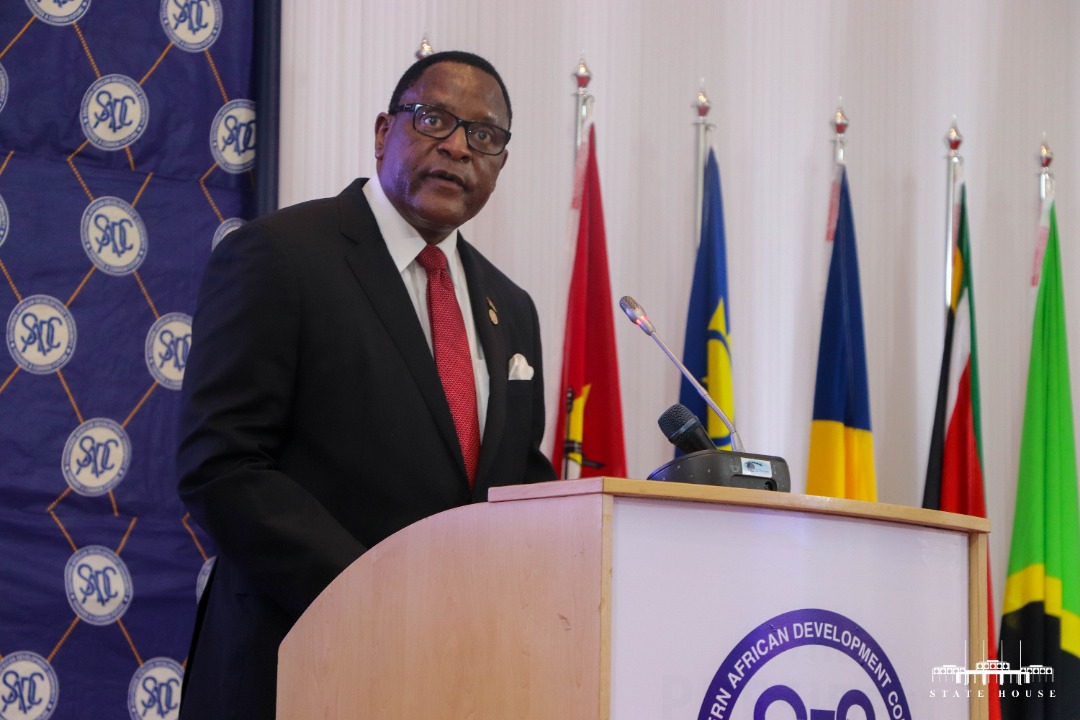By Chikumbutso Mtumodzi,
President of the Republic of Malawi Dr. Lazarus McCarthy Chakwera has taken over the Southern Africa Development Community (SADC) Chairship from Mozambican President, Filipe Nyusi, following the SADC Heads of State
and Government Summit held in Malawi’s capital, Lilongwe, which saw eight Heads of State converging on Lilongwe from 17 to 18 August 2021, to discuss ways of promoting a common development agenda for this regional
grouping.
The SADC Summit was also attended by other high-profile continental officials including Dr. Stergomena Lawrence Tax, the outgoing SADC Executive Secretary, Moussa Faki Mahamat, Chairperson of the African Union
Commission, Dr. Vera Songwe, Executive Secretary of the United Nations Economic Commission for Africa, and Dr. Akinwumi Adesina, President of theAfrican Development Bank (ADB).
In a joint communiqué released after the meeting, the Heads of State reaffirmed SADC’s commitment to various protocols that are aimed at promoting regional integration in areas such as peace and security, HIV-AIDS
and generally promoting development and resilience in the region in the face of various global Challenges.
The Heads of State also congratulated President Lazarus Chakwera and Malawi for assuming the leadership of the grouping for the next 12 months.
In his closing remarks at Bingu International Conference Centre (BICC), President Chakwera expressed his government’s commitment to the full implementation of the Summit decisions towards the creation of a SADC that
is peaceful and free, a SADC that is inclusive and united, a SADC that is productive and competitive, a SADC that is industrialized and prosperous, a SADC that is strong and just, adding Malawians expect and deserve nothing
less.

However, the question that many people would be asking is, what are the immediate take-home benefits for Malawi as a result of the President Chakwera’s Chairship of SADC? Obviously, people would ask such questions
based on the fact that this is not the first time for a Malawian Head of State to assume the role of SADC Chairship. Indeed, Bakili Muluzi was SADC Chairman in 2001 whilst Joyce Banda became Chairperson of the grouping in 2013, but
there is very little in terms of bankable development that one can write about that came as a result of these ‘Chairships’.
How different is President Chakwera going to be from Bakili Muluzi and Joyce Banda? Addressing delegates last year soon after Malawi was nominated to host the summit this year, President Lazarus Chakwera said Malawi is ready to
host the meeting, adding that the nomination symbolises the level of confidence SADC has in the leadership of this country. He said this was a huge opportunity for Malawi to sell the country in a positive way.
Ode to President Chakwera, the SADC Summit has indeed been hosted successfully, and obviously, the Heads of State and their entourages, who descended on Lilongwe will have many positive stories to tell about Malawi.
Apart from wearing their power suits and conducting ‘delegates’ business, many of them travelled and sampled the countryside whilst melting under the infectious smiles of local Malawians. Some of them took to the dance
floor to display their tango after getting high on Malawi Gin.
As a country, we also successfully used the opportunity to display to visitors the various products that are produced in Malawi in the hope of finding markets for the same within the region.
However, we know that when visitors come to our country, they always travel around and possibly purchase a curio or two and fly back to their countries. That is normal.
So what was President Lazarus Chakwera talking about when he said Malawi stands to benefit a lot as a country? The answer is very simple. President Chakwera will be different from his predecessors because he is leading the country and will be leading SADC in a political context that is substantially different from the Muluzi as well as the Joyce Band era.
Bakili Muluzi was the first multiparty President for Malawi, and it is important to appreciate the fact that many democratic institutions in the country [and even the region] were only just nascent and developing during his time.
Technology was also not as advanced as today where citizens can track progress against promises through such spaces as the social media without relying on the often-tweaked government information systems. The systems of
accountability were therefore not as strong as they are today.
It is a naked fact that the international profile of Joyce Banda, as an individual and as President of Malawi, was at the highest before she was ruined by the plunder of public resources by some civil servants christened as ‘Cashgate’. During her time as President, donors warmed up and the country’s bilateral partners became suddenly willing to forget all our transgressions before the party was spoiled by the Cashgate malfeasance.
One of the factors that propelled her to international prominence was because she became Chairperson of SADC during a time when the uptake of ICT was rising and citizens started to engage more directly with their
governments.
Although President Chakwera is becoming SADC Chair at a time when the world is grappling with the Covid-19 pandemic, Malawi stands a better chance of reaping enormous benefits from his SADC Chairship than at any
other time in the country’s history.
To begin with, Malawi recently launched the Malawi Vision 2063, which among other things envision the country to be a “wealthy and self-reliant middle-economy nation”, through investment in agricultural commercialization, smart urbanization, and sustainable industrialization. This vision dove-tails closely with SADC agenda 2050, which is to attain higher levels of peace and stability, at the same time achieve socio-economic development, poverty eradication as well as regional integration.
President Chakwera is also SADC Chair during the time when Covid-19 is heightening and fast-tracking the use of technology to minimize human contact as a way of avoiding the spreading of coronavirus. Already, the just ended SADC Summit was a hybrid mixture of physical and virtual conferencing where so many people followed proceedings online.
This is something unprecedented for SADC, and it may only be a precursor of what is to come in the future.
The scenario also only contributes to the narrowing of the interaction space between citizens and the leadership through technology, thereby bringing the President much closer to the people.
In the spirit of his ‘SUPER Hi5’ Agenda – Servant Leadership, Uniting Malawi, Prospering Together, Ending Corruption, and Rule of Law – President
Chakwera has already fostered of a culture of servant leadership within the Executive by pushing through reforms, which will encourage the development of human capital, governing institutions, and citizens’
supremacy.
As a servant leader who has always been closer to his people, President Chakwera will, therefore, have an opportunity to exploit this leverage to display his leadership acumen by exhausting the open lines of communication at local and international level, that have been enabled by technology, to ensure that Malawi reaps maximum benefits from his Chairship
of SADC.

The most notable benefit is access to the integrated over 300 million people SADC market for various commodities that are produced in Malawi. So when President Chakwera said, “We will have an opportunity to have a say in
business decisions in the SADC region, we will have opportunity to find market for our farm produce even our mineral resources”, he knew what he was talking about, and Malawi stands to benefit immensely from his Chairship of
SADC.
President Chakwera told his counterparts and delegates at the Lilongwe summit that the theme of this year’s Summit, “Bolstering Productive Capacities in the face of COVID-19 Pandemic for Sustained, Inclusive, Economic and Industrial Transformation,” was a call on all of them to respond pragmatically and proactively to the ravaging impacts of COVID-19 on the socioeconomic situation in the Region.
“Now is the time for us as a region to rebuild and recapacitate our productive resources.“Now is the time for us to fully unleash our peoples’ entrepreneurial capabilities. Now is the time for us to set up production linkages for achieving
structural and industrial transformation. Now is the time for us to turn the SADC we want into the SADC we enjoy,” said the President.
President Chakwera observed that clearly, the kind of socio-economic transformation member states envision cannot be achieved without industrialization. Diversification from raw and unprocessed materials to value added and manufactured products is a must, and the SADC Industrialization Strategy and Roadmap is key to making this a reality.
It is called visionary leadership!
***Views expressed are those of the author Chikumbutso Mtumodzi , who us the current Director of Information at Ministry of information***



